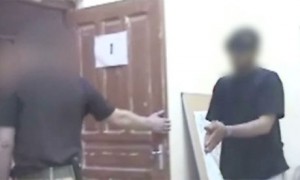Ecco l’Abu Graib degli inglesi. Stessi metodi degli americani. Un video sul “Guardian” mostra i metodi bestiali usati dai militari inglesi in Iraq (sopra un’immagine). Oggi sul giornale inglese Guardian del 5.11.2010, il video è su http://www.guardian.co.uk/uk/2010/nov/05/interrogation-techniques-iraq-inmates
Interrogation techniques at ‘Britain’s Abu Ghraib’ revealed
Video showing brutal mistreatment is submitted during high court proceedings brought by former Iraqi inmates
guardian.co.uk, Friday 5 November 2010 12.17 GMT
Evidence of systematic and brutal mistreatment of Iraqi prisoners at a secret British military interrogation centre that is being described as the UK’s Abu Ghraib emerged today during high court proceedings brought by more than 200 former inmates.
The court was informed that there is evidence detainees were starved, deprived of sleep, subjected to sensory deprivation and threatened with execution at the shadowy facilities near Basra operated by the Joint Forces Interrogation Team (JFIT).
It also received allegations that JFIT’s prisoners were beaten and forced to kneel in stressful positions for up to 30 hours at a time, and that some were subjected to electric shocks. Some of the prisoners say they were subjected to sexual humiliation by female soldiers, while others allege that they were held for days in cells as small as one metre square.
The evidence of abuse is emerging just weeks after defence officials admitted that British soldiers and airmen are suspected of being responsible for the murder and manslaughter of a number of Iraqi civilians in addition to the high-profile case of Baha Mousa, the hotel receptionist tortured to death by troops in September 2003. One man is alleged to have been kicked to death aboard an RAF helicopter, while two others died after being held for questioning.
Last month, the Guardian disclosed that for several years after the death of Mousa, the British military continued training interrogators in techniques that include threats, sensory deprivation and enforced nakedness, in an apparent breach of the Geneva conventions. Trainee interrogators were told that they should aim to provoke humiliation, disorientation, exhaustion, anxiety and fear in the prisoners they are questioning.
Lawyers representing the former JFIT inmates now argue that there needs to be a public inquiry to establish the extent of the mistreatment, and to discover at which point ultimate responsibility lies, along the chain of military command and political oversight. Today’s hearing marked the start of a judicial review intended to force the establishment of an inquiry. Michael Fordham QC, for the former inmates, said: “It needs to get at the truth of what happened in all these cases. It needs to deal with the systemic issues that arise out of them, and it needs to deal with the lessons to be learned.”
Fordham said the question needs to be asked: “Is this Britain’s Abu Ghraib?”
The Ministry of Defence (MoD) is resisting an inquiry, however. In a statement to the Commons on Monday, Nick Harvey, the Liberal Democrat armed forces minister, said the MoD should be allowed to investigate the matter itself, adding: “A costly public inquiry would be unable to investigate individual criminal behaviour or impose punishments. Any such inquiry would arguably therefore not be in the best interests of the individual complainants who have raised these allegations.”
Harvey said an inquiry would not be ruled out, “should serious and systemic issues” emerge as a result of the MoD’s own investigations.
Among the most startling evidence submitted to the high court in London today were two videos showing the interrogation of a suspected insurgent who was taken prisoner in Basra in April 2007 and questioned about a mortar attack on a British base.
The recordings – among 1,253 made by the interrogators themselves – show this man being forced to stand to attention while two soldiers scream abuse at him and threaten him with execution. They ignore his complaints that he is not being allowed to sleep and that he has had nothing to eat or drink for two days. At the end of each session, he is forced to don a pair of blackened goggles, ear muffs are placed over his head, and he is ordered to place the palms of his hands together so that a guard can grasp his thumbs to lead him away.
At the end of one session, an interrogator can be heard ordering the guard to “rough the fucker off”, or possibly “knock the fucker off”. The guard then runs down a corridor, dragging the prisoner behind him by his thumbs. This man’s lawyers say he was then severely beaten: they allege that the initial blows, and their client’s moans, can be heard faintly at the end of the video.
An investigation by the army in January 2008, which examined just six cases of alleged abuse by British troops, described them as cause for “professional humility”, but concluded that such incidents were not “endemic”. However, the report did not address the possibility that some mistreatment was systematic, with those responsible acting under orders and in accordance with a pre-war training regime that called for repeated use of abusive techniques.
Responding to today’s hearing, Brigadier John Donnelly of the MOD’s Judicial Engagement Policy department, said in a statement: “These are unproven allegations. We have set up the dedicated Iraq Historic Allegations Team (IHAT) to investigate them as quickly and thoroughly as possible. The IHAT is headed by an independent former CID officer.
“The IHAT is the most effective way of investigating these unproven allegations – to establish their truth or otherwise, identify any action that needs to be taken, including dealing with any connected or systemic issues and, should it uncover criminal behaviour, provide the proper means to deal with it. In our view a costly new public inquiry is not necessary or appropriate. “It would be unable to investigate individual criminal behaviour or impose punishments and will not serve the interest of fair and expeditious justice.”


